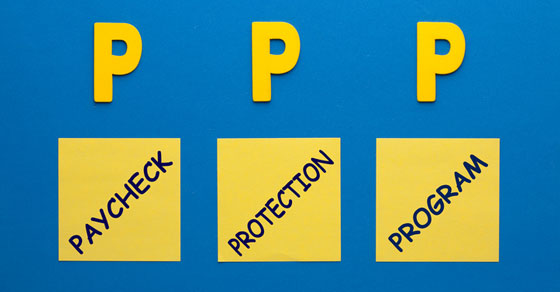As we enter 2021, you may be thinking about the tax consequences of the Paycheck Protection Program (PPP) loan that you received in 2020. You may also be aware that PPP has reopened.
We can help you explore the tax implications of PPP and assist in understanding the new round of loans.

Background on the loans
In March of 2020, the CARES Act became law. It authorized the SBA to make loans to qualified businesses under certain circumstances. The law established the PPP, which provided up to 24 weeks of cash-flow assistance through 100% federally guaranteed loans to eligible recipients. Taxpayers could apply to have the loans forgiven to the extent their proceeds were used to maintain payroll during the COVID-19 pandemic and to cover certain other expenses.
At the end of 2020, the Consolidated Appropriations Act (CAA) was enacted to provide additional relief related to COVID-19. This law includes funding for more PPP loans, including a “second draw” for businesses that received a loan last year. It also allows businesses to claim a tax deduction for the ordinary and necessary expenses paid from the proceeds of PPP loans.
Second draw loans
The CAA permits certain smaller businesses who received a PPP loan and experienced a 25% reduction in gross receipts to take a PPP second draw loan of up to $2 million.
To qualify for a second draw loan, a taxpayer must have taken out an original PPP Loan. In addition, prior PPP borrowers must now meet the following conditions to be eligible:
- Employ no more than 300 employees per location,
- Have used or will use the full amount of their first PPP loan, and
- Demonstrate at least a 25% reduction in gross receipts in the first, second or third quarter of 2020 relative to the same 2019 quarter. Applications submitted on or after Jan. 1, 2021, are eligible to utilize the gross receipts from the fourth quarter of 2020.
To be eligible for full PPP loan forgiveness, a business must generally spend at least 60% of the loan proceeds on qualifying payroll costs (including certain health care plan costs) and the remaining 40% on other qualifying expenses. These include mortgage interest, rent, utilities, eligible operations expenditures, supplier costs, worker personal protective equipment and other eligible expenses to help comply with COVID-19 health and safety guidelines or equivalent state and local guidelines.
Eligible entities include for-profit businesses, certain non-profit organizations, housing cooperatives, veterans’ organizations, tribal businesses, self-employed individuals, sole proprietors, independent contractors and small agricultural co-operatives.
Deductibility of expenses paid by PPP loans
The CARES Act didn’t address whether expenses paid with the proceeds of PPP loans could be deducted on tax returns. Last year, the IRS took the position that these expenses weren’t deductible. However, the CAA provides that expenses paid from the proceeds of PPP loans are deductible.
Cancellation of debt income
Generally, when a lender reduces or cancels debt, it results in cancellation of debt (COD) income to the debtor. However, the forgiveness of PPP debt is excluded from gross income. Your tax attributes (net operating losses, credits, capital and passive activity loss carryovers, and basis) wouldn’t generally be reduced on account of this exclusion.
Assistance provided
While we have covered the basics of PPP loans, aspects of the loans, including the loan applications, forgiveness applications, and tax treatment, all come with their own complexities. Please contact your Rudler PSC advisor at 859-331-1717 for assistance on all facets of PPP.
RUDLER'S TAX MANAGEMENT & PLANNING TEAM
This week's Rudler Review is presented by Devin Curren, Staff Accountant and Melanie Smart, CPA.
If you would like to discuss your particular tax situation, contact Devin or Melanie at 859-331-1717.


Rudler PSC has established a Tax Management and Planning Team, a group of professionals who specialize in tax services. These highly qualified and experienced tax specialists meet on a regular basis to discuss upcoming client engagements, current issues relating to our clients and regulatory changes. Be sure to receive future Rudler Reviews for advice from our tax experts, sign up today !